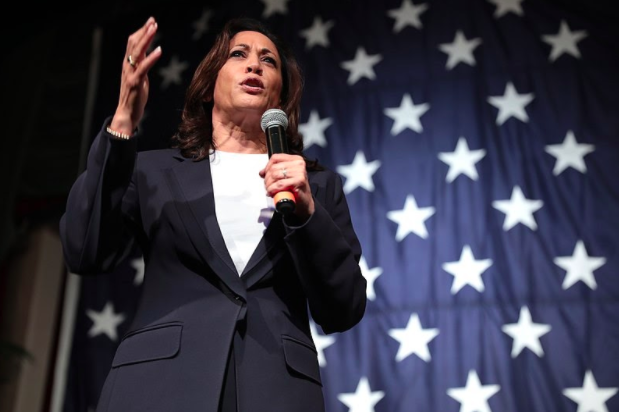Editor’s Note: This post is the first part in a series examining failed 2020 candidacies. See our other campaign postmortem posts: Julián Castro, Michael Bennet, Jay Inslee, Deval Patrick, Cory Booker, Kirsten Gillibrand, Marianne Williamson
by Lindsay Nugent and Grace Varcadipane
After being elected to serve as California’s junior senator in 2017, Kamala Harris was widely acknowledged as a rising star in the Democratic Party, and as a formidable contender for the 2020 Democratic Nomination. This was especially true after she gained national attention by grilling now-Supreme Court Justice Brett Kavanaugh over sexual assault allegations against him during his Senate confirmation hearings in 2018. However, for Harris as well as for most candidates, the ability to appeal to a wide audience, gain traction, attract donors, raise poll numbers, and establish a plausible case for winning in November, are what make or break a campaign. Without these things, candidates struggle to hold their ground. Kamala Harris ended up being unsuccessful in her endeavors, despite the high expectations established at the onset of her campaign.
After her strong performance in the first Democratic debate in late June 2019, Harris soared to second in the polls, behind only former Vice President Joe Biden. However, her poll numbers slowly declined after reaching this peak, and never recovered. She stood out from other candidates in that she had progressive, yet not as radical ideas as some of her opponents in the primary. Many of these ideas were in line with the most recent Democratic administration, the Obama Administration. However, she carefully made her own individual campaign platform choices, rather than simply attaching ‘for all’ at the end of every reform. For example, her health care reform policy, released in July 2019, advocated for the expansion of health care for those who need it most, though privatized insurers would also remain as an option for those who wanted.
Being of Indian and African-American descent, Harris was thought to be in a good position to gain support and traction among voters of color. Despite being a woman of color herself, she failed to appeal to enough voters of those demographics. Due to her significant experience in government, it appeared that she banked on her role as Former Attorney General of California, as well as being a member of the Senate since 2017, to help her with her candidacy.
Unfortunately, her prominent positions in government failed to boost her popularity among voters, as many of them didn’t know enough about Senator Harris. Her appearance on the podcast “The Breakfast Club,” where she said she smoked weed while listening to Tupac and Snoop Dog, led to some criticism that she was pandering to black voters. She gained little traction from the demographics she was expected and had hoped to win over.
As the months went by, Senator Harris’s campaign began to struggle. She failed to keep up with the candidates who had national name recognition or money— such as former Vice President Joe Biden and Senator Bernie Sanders, both of whom were able to maintain the support of a national base. Furthermore, both of those candidates did well in their respective lanes as the leading moderate and leading progressive candidates at the time, whereas Harris struggled to find her niche. In Harris’s case, she lacked the polling numbers after her first post-debate boost faded, but more specifically, didn’t connect enough with voters. Mix in the lack of campaign funds, and on the other side of that equation is dropping out from the race.
A major issue among voters today, especially progressives, is criminal justice reform. As both the former District Attorney of San Francisco and Attorney General of California, Harris’s record on criminal justice stretched back to the early 1990s, an era when “tough-on-crime” policies were popular among both parties. This had led to her record reflecting a mix of reformist policies and prosecutorial decisions, as well as the more punitive criminal justice policies, including harsh sentencing for non-violent drug offenders, that were typical of their time. Because of this, many voters were skeptical of her progressive credentials and her stated commitment to legalizing recreational marijuana on the federal level. Some of her critics labelled her as a “cop.” Despite this, her record included some decisions that reflected strong liberal beliefs, such as declining to defend Proposition 8, the California ballot initiative that prohibited same-sex marriage. Kamala Harris’s campaign slogan was “For the People,” a phrase which originated from her days as a California prosecutor. Had her campaign been successful, it would have truly been a campaign meaningful for so many people, especially for women and people of color. However, in one of the most crowded Democratic presidential fields in recent memory, Harris failed to gain the momentum she needed to secure the nomination. To the shock of many, she suspended her campaign earlier than expected, on December 3, 2019, despite having already qualified for the debate scheduled for later that month. By understanding that her campaign was fighting a losing battle and choosing to exit the race on her terms, she made a decision that was remarkable among her fellow candidates, as far too many of them clung— or are still clinging to— the presidential race with little to no chance of winning the nomination.
